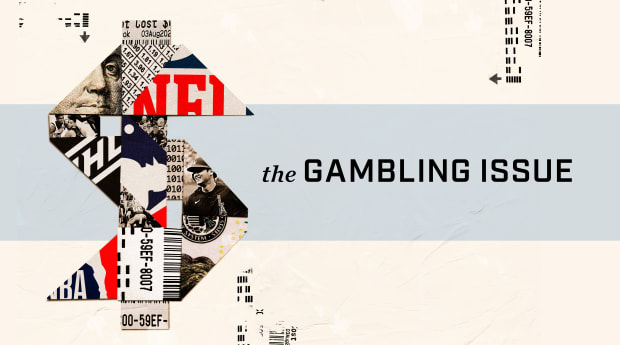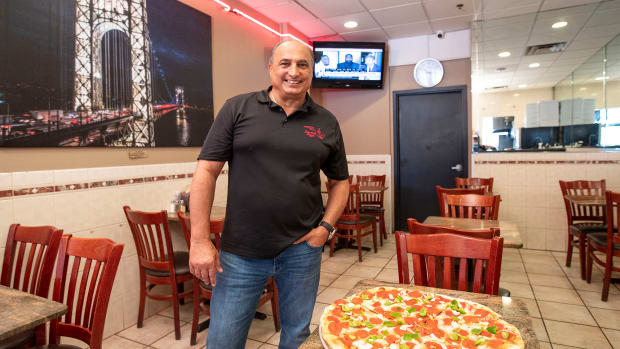With gambling slower to come to some states, bettors are crossing borders to put down wagers—including at a Jersey pizzeria.
What’s changed in the three years since the Supreme Court granted all 50 states the right to legalize sports betting? Everything. By the end of 2021, online or in-person wagering will be sanctioned in more than half the country. Revenue is skyrocketing. Leagues are evangelizing. And booming business means big changes for anyone who operates, plays, covers—or bets on—the games we love. Welcome to The Gambling Issue.
When Jim Missiris opened Linwood Pizza in Fort Lee, N.J., 43 years ago, he thought he was merely running a restaurant that would churn out pies, Buffalo wings and trays of penne oozing with vodka sauce. In recent years, though, Missiris has seen his pizzeria take on an additional purpose, especially during weekend mornings in the fall.
Missiris’s enterprise benefits immensely from its location; the George Washington Bridge—connecting Jersey to New York City—is less than a mile away. And over the past three years, that placement has proved particularly advantageous due to the neighboring states’ differing laws regulating online sports betting. In
August 2018, New Jersey became the first state outside Nevada to accept legal sports wagers online, while New York will not sanction any online action until the upcoming football season at the earliest. So in recent years, family-owned Linwood Pizza, nestled between a Starbucks and an outdoor gear store in the nondescript Fort Lee Plaza, has become a hub for New York sports bettors eager to try their luck on NCAA or NFL games. “I love it,” Missiris says. “It’s almost like a party, being in here.”
During football season Missiris, 64, leaves his home in Rockland County, N.Y., around 9 a.m. After a 25-minute drive he’ll fire up his ovens and start prepping for the early-morning rush. On a normal weekday he initially whips up 12 specialty pies. During football season, to account for his hungry wagerers, that number goes up by 50%.
When the pizza parlor opens its doors at 11, groups of customers file into the mirror-plastered dining room, which seats 32. Patrons order food as they pull tip sheets out of their pockets and backpacks. Conversations turn to how the afternoon’s games will go and which teams to bet on. Cellphones essentially replace the sportsbook window. Until three years ago, Missiris says, “We wouldn’t get busy till 2 or 3 o’clock, but now, with this betting phenomenon, it’s busy from the start.”
Traveling over state lines to wager on sports is not a new concept—or one unique to New York and New Jersey. Before the Supreme Court’s 2018 decision to strike down a law that prohibited sports betting outside Nevada, customers traveled to the Silver State to place legal wagers.
But as states adopt legislation permitting online sports betting—as of July 1, 14 other states and Washington, D.C., had joined Nevada and New Jersey with some form of legalized online sports wagering—that paradigm is shifting. “People were always willing to go to great lengths to [bet on sports],” says Jeff Hoose, FanDuel’s regional manager for the Midwest. “Now, it’s just becoming much more convenient.”
Yet nowhere has the phenomenon of borderhopping to bet online been more prevalent than in New York and New Jersey. Says Chris Grove, a partner at Eilers & Krejcik Gaming, a gambling research and consulting firm. “There really just aren’t a lot of other situations where you have that kind of population, a major mass that close to another state’s borders.”
Joseph P. Addabbo Jr. is a lifelong resident of Queens. He played hockey, football and baseball growing up and fell in love with the Mets around the time that Tom Seaver was becoming one of the all-time greats. As he’s aged, Addabbo has lived with the seemingly annual suffering fans of his favorite team endure. While watching baseball, he’s also grown accustomed to experiencing another frustration.
“If I’m watching the Mets game and I see commercials come on for Jersey and mobile sports betting, and it’s geared to the New Yorker but it’s about betting in Jersey, I want to throw my shoe at the TV,” Addabbo says.
Addabbo has been a member of the New York state Senate since 2009, where he currently chairs the committee on racing, gaming and wagering. He has long wanted New York to legalize online sports betting. For years, his pleas were largely dismissed.

A recent study conducted by Eilers & Krejcik found that in 2019, New York residents wagered $837 million in New Jersey on sports bets, amounting to around 20% of the $4.6 billion handle in New Jersey. Bettors merely need to be within New Jersey boundaries when their wager is placed, which is why 44% of all mobile bets in the state were made within two miles of the border, according to GeoComply, a leading geolocation tracking company.
Bettors will travel in from anywhere and everywhere around the 108-mile New York–New Jersey border, by car, bus and even bicycle. A PATH train from Christopher Street in lower Manhattan takes less than 10 minutes to get into Hoboken, N.J., making rail an especially popular mode of transportation to place a quick wager.
For instance, on Super Bowl Sunday in 2020, data recorded by GeoComply found that the volumes both before and during the Chiefs-49ers game were highest in and around Hoboken. Numbers there were disproportionately “inflated by commuting New York City bettors,” Eilers & Krejcik wrote in a report analyzing the phenomenon, and vastly exceeded the total bets placed in Jersey City, which has five times Hoboken’s population. Even in June, one could find a DraftKings advertisement with the tagline “Settle Into the Land of Anything Can Happen” up a flight of stairs from the PATH train platform, marking just one of the many DraftKings ads in the popular transportation hub.
“That’s our money leaving our state,” Addabbo says. “New York is the major capital of sports in the world, and here we are playing catch-up in mobile sports betting. It’s kind of a hard position for New York to be in.”
In recent years other states have also watched from the sidelines as their neighbors generate additional revenue from sports betting. Hoose recalls that when FanDuel opened an in-person sportsbook in Northwood, Iowa, in August 2019, hundreds of Minnesotans flocked to witness Vikings great John Randle place the first bet. And gamblers have continued to come from Minnesota for the betting windows just inside the border.
At a hearing in June, Massachusetts legislators cited a DraftKings statistic saying that 30% of the company’s sports bettors in New Hampshire over the last year had Massachusetts addresses.
“This is really one of the underlying themes of gambling expansion in the U.S.,” Grove says, “which is how do [states] pull revenue from neighboring states in order to shore up [their own] budget?”
Since the Supreme Court struck down the Professional and Amateur Sports Protection Act in the spring of 2018, 31 states have approved laws legalizing sports betting, either online or at physical sportsbooks (laws in nine of those states have not yet gone into effect). In April, Addabbo finally got his wish as New York passed language in its budget allowing for mobile sports wagers, doing so amid an economic deficit largely caused by COVID-19. He says that the additional tax revenue generated from online betting will be allocated, in part, to educational funding, gambling awareness programs and creating jobs.

“I think it changed the trajectory of gaming, especially online gaming, maybe forever,” Addabbo says of the pandemic. “We’re usually out front, but here we have been that wobbly car in the right lane and all these other fast cars, like Jersey and Pennsylvania, are whizzing right by us.”
The state is hoping to have its first online sports bet placed this coming football season. But Super Bowl LVI in February remains the “key date,” in Addabbo’s words, in evaluating how the state is faring.
Addabbo recognizes that the mere act of passing legislation won’t definitively end the border-hopping phenomenon. Questions still remain about what New York’s online gambling product will look like, what the tax rate will be and what the state’s philosophy will be on pricing and promotions.
Then, there is also a question that ties back to the bettors who frequent Linwood Pizza or show up at the Starbucks next door to Missiris’s shop: Even with legislation passed, will bettors still visit such establishments as a means to socialize?
“It gets them out of the house on a Sunday morning,” Missiris says. “They take a ride over the bridge and hang out with each other. They talk, they laugh. Everybody makes their bets. They get their slices and then they go.”
If that’s the case, maybe, out of habit, Missiris’s weekend morning customers will still come out because they enjoy the food, company, atmosphere and betting convenience. Says Grove, “If you describe the pizza parlor in agnostic terms of what’s happening there on Sunday—people are watching sports, eating food and betting. It would be indistinguishable from how you describe the sportsbook.”
And while Missiris loves engaging with his customers, he also knows to maintain some distance. In recent years he has grown so close with a number of them that they have even asked for advice on who to bet on. “But I never get involved,” Missiris says. “Because if I give you a loser you’ll know where to find me.”


0 Comments